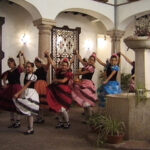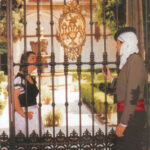The fandango antequerano is a calm and ceremonious dance that, despite its popular character, is more like a ballroom dance. It is usually danced in two parts, of three stanzas each, which are composed in turn of a dance step and a paseíllo that is repeated in all of them. The music, lyrics and instruments that accompany this dance are also popular. In this sense, it is worth mentioning the use of a homemade instrument, the almirez, which marks the compass of the fandango.
The costumes with which the fandango antequerano is danced are very elegant. The woman wears a black velvet bodice, with short silk sleeves of the same color as the skirt, which is adorned with one or two strips of black or beige lace. She also wears petticoats, puchos and white stockings, the latter woven by hand. The shoes are black heels, with ties that are tied to the legs. The head is adorned with a lace headdress and carnations.
For his part, the man wears a white shirt with a red sash at the waist and a discreet colored jacket adorned with caireles and fleurs-de-lis made of felt. The pants are made of the same cloth as the jacket, tight and short, and are accompanied by ankle boots and leggings. The set is completed by a handkerchief knotted to the head, as a bandit, and black castite.
Apart from the fandango, our city also has two songs that are part of its folklore: La Zapatilla, a song typical of family gatherings and celebrations, mainly Christmas; and El Feliciano, typical song of excursions and country walks, which involves a dance similar to the parades.
There are countless popular songs and games for children, compiled by local specialists in the field.
Flamenco and Copla in its brilliant history has a list of antequeranos and antequeranas that widen the already large Andalusian presence.
For some years a very interesting movement has been developing in Antequera around Blues and jazz. Every year, in the month of July, the prestigious and renowned Blues Festival is celebrated, which floods different spaces of the city in the enveloping and suggestive rhythms of this musical manifestation. In addition, also in the month of July, a jazz festival known as Najera Jazz is celebrated, which is becoming increasingly popular in our city.


